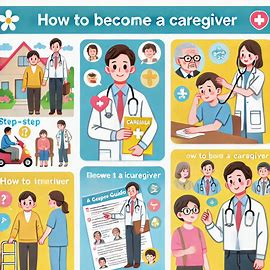Caregiving is a deeply rewarding profession that allows individuals to provide essential support to those in need due to age, illness, or disability. If you’re considering this career path, understanding the steps involved is crucial. Here’s a comprehensive guide on how to become a caregiver.
Understand the Role
Caregivers play a vital role in improving the quality of life for their clients. Responsibilities typically include assisting with personal care, managing household tasks, offering emotional support, and sometimes providing basic medical assistance. Knowing what the job entails helps you prepare mentally and physically.
Evaluate Your Skills
Successful caregivers possess certain traits, including empathy, patience, strong communication skills, and physical stamina. Reflect on these qualities and identify areas for improvement to ensure you can handle the demands of caregiving.
Obtain Basic Education
While formal education requirements vary, a high school diploma or its equivalent is often necessary for entry-level roles. This foundation prepares you for further training and certifications.
Gain Experience
Practical experience is invaluable in caregiving. Volunteer at nursing homes, assist family members, or join community programs that offer caregiving opportunities. Hands-on experience not only enhances your skills but also strengthens your resume.
Pursue Training and Certification
Many caregiving positions require specialized training. Common certifications include CPR and First Aid, Certified Nursing Assistant (CNA), or Home Health Aide (HHA). These programs teach essential caregiving techniques and ensure you’re equipped to handle various situations.
Check Licensing Requirements
Depending on your location, you may need a license to work as a caregiver. Licensing typically involves completing approved training programs, passing exams, and meeting health and background check requirements.
Choose a Specialization
Caregiving offers opportunities to specialize in areas such as elderly care, pediatric care, or support for individuals with specific conditions like Alzheimer’s or physical disabilities. Specialization allows you to develop expertise and enhance your career prospects.
Search for Job Opportunities
Caregiving positions are available through agencies, hospitals, nursing homes, and online platforms. Build a professional resume highlighting your experience, certifications, and personal attributes. Networking and community involvement can also help you find job leads.
Build Strong Relationships
Caregivers work closely with clients and their families. Effective communication, respect, and dependability are key to building trust. Positive relationships often lead to long-term opportunities and referrals.
Commit to Continuous Learning
The caregiving field evolves with advancements in techniques and technology. Stay informed by attending workshops, taking advanced courses, and learning about new caregiving tools. Continuous growth ensures you provide the best possible care.
Caregiving is a career of compassion and dedication. By following these steps, you can make a meaningful impact in the lives of others while building a fulfilling profession for yourself.
